
TROPICAL ASIA
Explore the forests of Tropical Asia
ABOUT THE ExHIBIT
The dense tropical forests of Asia hold some of the world’s most endangered species. Our Tropical Asia zone features the Trail of Vines, home to orangutans and siamangs. Across the main loop path, the zone continues with Banyan Wilds, home to tigers, sloth bears, Asian small-clawed otters, and a variety of birds, all dependent on forests to survive. This unique part of the world has some of the most densely human-populated cities as well as the last vestiges of wild habitats—a balancing act that is increasingly putting animals on the brink of extinction. See the amazing animals from Asia and discover how you can help protect them.
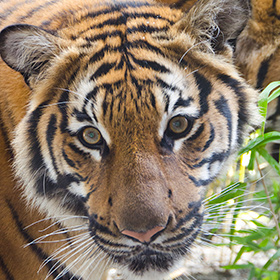
Malayan Tiger
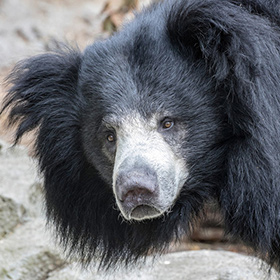
Sloth Bear
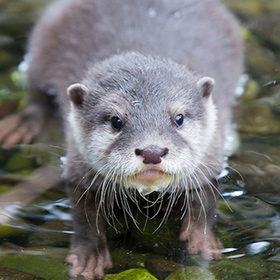
Asian small-clawed Otter
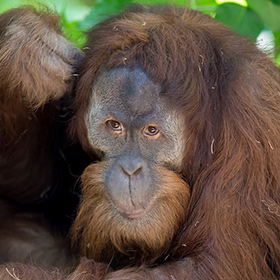
Orangutan
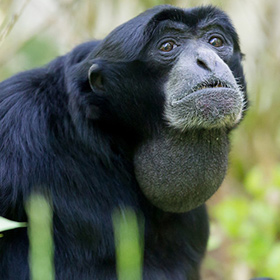
Siamang
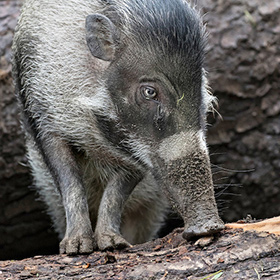
Warty Pig
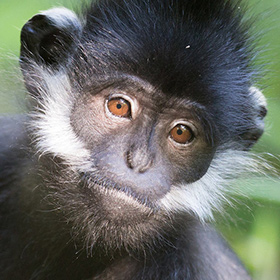
Langur
SPECIES SPOTLIGHT
About Orangutans
Sumatran orangutan (Pongo abelii)
Bornean orangutan (Pongo pygmaeus)
Status
Critically endangered
Range
Distinct species of orangutans live on the islands of Borneo and Sumatra in Southeast Asia
Habitat
Tropical and subtropical moist broadleaf forests. Lower densities in mountainous areas
Conservation Connection
Every time you visit our orangutan family, you make it possible for Woodland Park Zoo to support critically endangered orangutans in the wild. Our Partner for Wildlife, the Gunung Palung Orangutan Conservation Project, helps protect forest habitat for these great apes. You can too.
Take Action at Home
Make a promise to orangutans that you will shop with companies that are members of the Roundtable on Sustainable Palm Oil and/or are committed to using deforestation-free certified sustainable palm oil.
Meet the Orangutans
At the Trail of Vines exhibit in the Tropical Asia zone, look for these familiar faces.
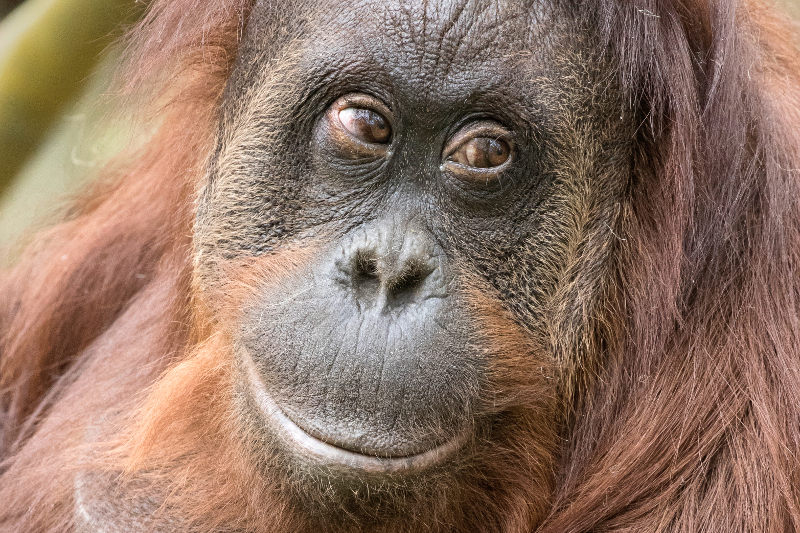
Belawan (aka Bela)
Name:
Inspired by a Sumatran river
Born:
May 17, 1981 at Woodland Park Zoo
Family:
Daughter of Towan and Melati, sister of Heran, niece of Chinta
How to spot her:
Look for Bela’s long coat and beautiful eyes rimmed in a lighter skin color.
About Belawan:
Belawan is independent and curious. And boy can she be stubborn. When Belawan wants something, she wants it right away. Belawan is inquisitive and inventive. She loves to break branches outside and bring them inside to “fish” for things that are meant to be out of her reach—like plants, hoses and garbage can liners. She is also known for tying knots in sheets and has even been seen making a tent!
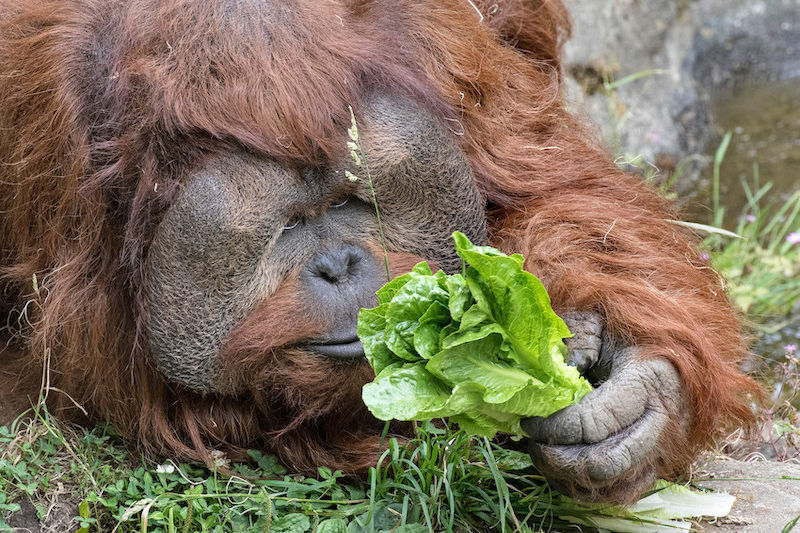
Heran
Name:
Means “surprise” in Indonesian
Born:
February 19, 1989 at Woodland Park Zoo
Family:
Son of Towan and Melati, brother of Belawan, nephew of Chinta
How to spot him:
Largest of the orangutans, Heran is distinguished by his large cheek pads and throat pouch
About Heran:
Heran is an ape who feels everything deeply. When he gets excited or upset or worked up, he’s quick to make a big display. But you might find him ducking behind a rock five minutes later—he’s known to hide when he feels uncertain about a situation. Heran feels most confident when he settles into a routine, and if that routine includes lots to eat, all the better. This big guy has a big appetite.
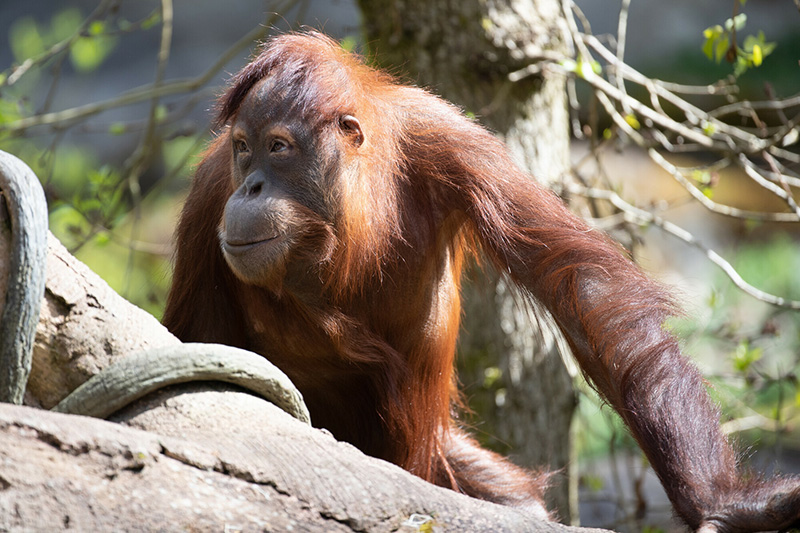
Batu
Name:
Inspired by an Indonesian place name
Born:
October 2, 2009
How to spot her:
The skin on Batu’s eyelids is very light, which is a sign of being young. This lightness will go away as she matures.
About Batu:
You can often spot her with her favorite purple blanket, or eating one of her favorite snacks which is peanuts. Batu is known for being inquisitive and playful.
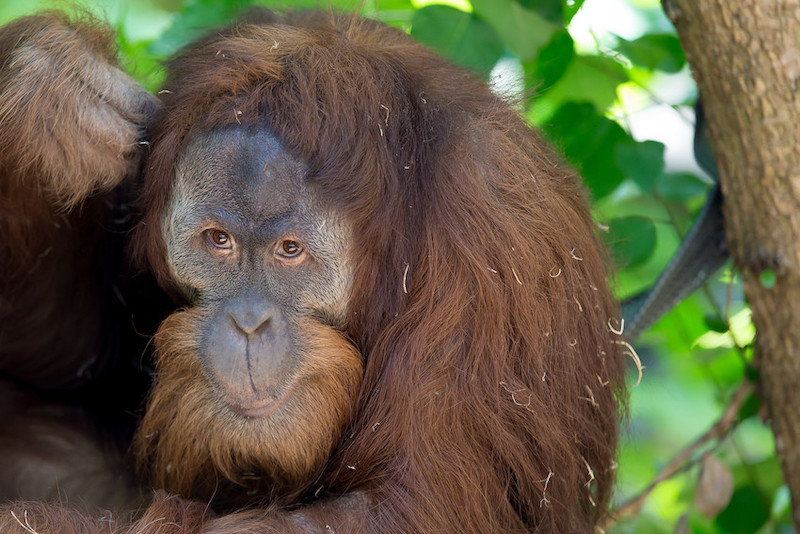
Godek
Name:
Means “sideburns” in Indonesian
Born:
February 19, 2009
How to spot him:
Godek is easily distinguished from the other male, Heran, because he has not yet developed prominent cheek pads.
About Godek:
Godek is energetic and always ready to explore! He also loves to brush his teeth.